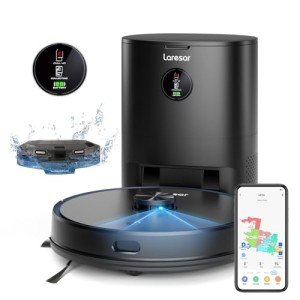Are You Responsible For A Autonomous Vacuum Budget? 10 Unfortunate Ways To Spend Your Money
The Rise of Autonomous Vacuums: Revolutionizing Home Cleaning
In the age of technology, home tasks are becoming progressively automated, and one of the most significant advancements in this realm is the autonomous vacuum. These smart cleaning robots are developed to minimize the drudgery of conventional vacuuming, making them popular amongst time-strapped homes. This short article checks out the development, functionality, advantages, and restrictions of autonomous vacuums, together with a contrast of some of the leading designs on the marketplace today.
What is an Autonomous Vacuum?
An autonomous vacuum, likewise called a robotic vacuum cleaner, is a small, automatic device that navigates through your home to clean floorings without human intervention. Equipped with sensing units, electronic cameras, and advanced software application, these vacuums can identify barriers, prevent stairs, and enhance cleaning courses. They normally operate from a rechargeable battery, returning to their charging stations when their power is low or when cleaning jobs are completed.
Key Features of Autonomous Vacuums
Smart Navigation:
- Utilizes sensing units and algorithms to map the environment.
- Can navigate intricate layouts and avoid barriers.
Scheduling:
- Allows users to set cleaning times.
- Can operate when your house is empty, making sure minimal disturbance.
Connection:
- Many models link to Wi-Fi, allowing for app control and integration with wise home systems.
- Users can customize settings, check cleaning status, and get notices through mobile applications.
Suction Power:
- Varies in between designs; some offer adjustable suction settings for various floor types.
- High-end designs include effective suction efficient in getting animal hair and deep dirt.
Floor Type Adaptability:
- Capable of cleaning carpets, wood, tiles, and more.
- Particular designs specialize in tailored cleaning for numerous surfaces.
The Advantages of Using Autonomous Vacuums
1. Time-Saving
Among the most substantial advantages of autonomous vacuums is the quantity of time they conserve. Rather than spending hours pressing a traditional vacuum, house owners can set robotic vacuums to clean while they are engaged in other activities.
2. Constant Cleaning Schedule
With the ability to set up cleansings, these vacuums guarantee that areas are regularly cleaned up, leading to a cleaner home overall. Regular cleaning helps keep indoor air quality, specifically for families with allergies or asthma.
3. Smart Home Integration
Numerous autonomous vacuums can be integrated with wise home systems for seamless operation. Property owners can control their vacuums via voice commands through devices like Amazon Alexa or Google Assistant, enhancing user benefit.
4. Compact Design
The slim profile of these gadgets allows them to clean up under furnishings, such as couches and beds, where traditional vacuums often can not reach.
5. Pet-Friendly
For pet owners, autonomous vacuums can be a game-changer, as they are frequently equipped with specialized functions for choosing up pet hair and dander, adding to a cleaner home environment.
Limitations of Autonomous Vacuums
In spite of their many advantages, autonomous vacuums also have limitations:
1. Limited Deep Cleaning
While these vacuums effectively maintain tidiness, they may not change the effectiveness of a deep tidy supplied by standard vacuums, particularly for heavily stained locations.
2. Capacity Constraints
The majority of autonomous vacuums included small dust bins that require to be cleared frequently, particularly in bigger homes or homes with animals. This can be a trouble for some users.
3. Navigation Challenges
Although navigation innovation is continuously enhancing, some models may have a hard time with specific designs, particularly complex spaces with many barriers or extremely small rooms.
4. Cost Point
While costs have ended up being more available, high-end models can still be rather expensive, posturing a barrier for some customers.
Comparison of Top Autonomous Vacuum Models
Design
Smart Features
Battery Life
Suction Strength
Price Range
iRobot Roomba 980
App Control, Voice Assistant
120 minutes
1700 Pa
₤ 700 – ₤ 900
Roborock S6 MaxV
Advanced Mapping, Connectable
180 minutes
2500 Pa
₤ 600 – ₤ 800
Ecovacs Deebot Ozmo
Mopping, Smart Home
110 minutes
1500 Pa
₤ 450 – ₤ 700
Neato Botvac D7
Laser Navigation, Custom Zones
120 minutes
2000 Pa
₤ 800 – ₤ 900
Shark IQ Robot
Self-Emptying Base, Smart Map
90 minutes
1500 Pa
₤ 400 – ₤ 600
Notable Takeaways
- Smart Features: Consumers should prioritize models offering robust smart features for convenience and performance.
- Battery Life: A longer battery life is helpful for bigger living spaces.
- Suction Strength: Depending on home requirements, differing suction power can substantially impact cleaning efficiency.
Frequently Asked Questions about Autonomous Vacuums
Q1: How do I maintain my autonomous vacuum?
A: Regular maintenance includes cleaning the brushes, emptying the dustbin, and looking for obstructions. In addition, keeping the sensors clean up will assist maintain navigation precision.
Q2: Can robotic vacuums tidy rugs and carpets?
A: Yes, many robotic vacuums are designed to successfully tidy both tough surfaces and carpets. However, suction power might differ based upon the model.
Q3: Do robotic vacuums need Wi-Fi?
A: While numerous autonomous vacuums gain from Wi-Fi connectivity for app control and updates, some models can operate independently without a cordless connection.
Q4: How typically should I run my robotic vacuum?
A: It depends on your living circumstance, but running it a number of times a week is frequently suggested, especially for homes with family pets.
In conclusion, autonomous vacuums represent a substantial advancement in home cleaning innovation, promising convenience and efficiency. While Click Webpage might not completely change conventional vacuum cleaners, they are undoubtedly valuable in maintaining a clean living environment. As innovation continues to progress, the future of home cleaning looks appealing, and these devices are at the leading edge of the transformation.
